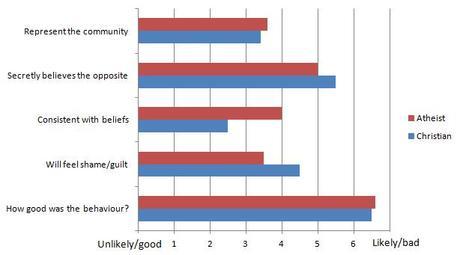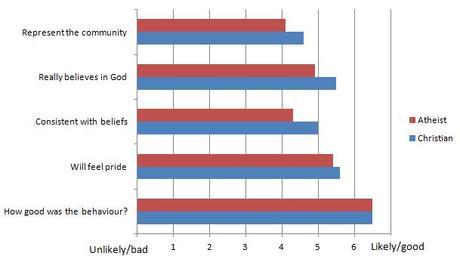
The rating of the atheist’s and Christian’s behavior in the immoral action
And, despite being essentially the same person behaving in the same way, the atheist was viewed as more immoral. They were ranked as less likely to feel ashamed; less likely to right the wrong. The community as a whole was also viewed poorly. It was viewed as more consistent with atheistic belief and the community was more likely to forgive them. Steve was also ranked as more likely to secretly not believe in God, whilst this was viewed as perfectly consistent with Brian’s atheism. They also repeated this experiment; but with a good outcome. This time Steve and Brian donated half their yearly income to a homeless charity. Again though, the Christian was viewed as more moral than the atheist. In fact it was even voted quite highly that Brian secretly believed in God after all. In both cases the difference was minor (with the exception of the consistent with community. The bad behavior was viewed as a lot more consistent with atheism; the good a lot more inconsistent). Steve was only viewed as slightly more moral than Brian in these situations, but that’s not what’s interesting about these results. No, what’s most interesting is that when the results were cross referenced with demography, both the religious and non-religious were equally likely to rank the atheist as less moral; even suggest that when he was moral, it was because he secretly believed in God.
The rating of the atheist and theist’s behaviour for the moral action
However, before drawing too many conclusions from this study something leapt out at me as fishy. The authors noted that both the atheists and Christians were just as likely to answer the same way. Yet one of the questions was to rank the possibility of the individual being punished by God. Surely atheists, regardless of how they viewed the morality of others, would rank this as very low in both cases. After all, they don’t believe in a God. Sure enough when you dig down, you find that they were separating out religious v. non-religious when examining their participants. The problem is that non-religious is not the same as atheism. It includes all those “spiritual but not religious” types, many New Age-ers and a bunch more categories that aren’t atheistic. Without breaking it down further and looking at just how many atheists ranked their fellow atheist as immoral these results don’t really show anything. It might just be showing that spiritual people are just as likely as overtly religious people to rank atheists as immoral!Still, it raises some interesting questions. After 10,000 years, has the relationship between religion and morality become internalised to the point that even atheists will rate other atheists as immoral? Non-believers of the world: are you particularly judgemental of others non-believers?Reference
WRIGHT, J., & NICHOLS, R. (2014). The Social Cost of Atheism: How Perceived Religiosity Influences Moral Appraisal. Journal of cognition and culture, 14(1-2), 93-115.

